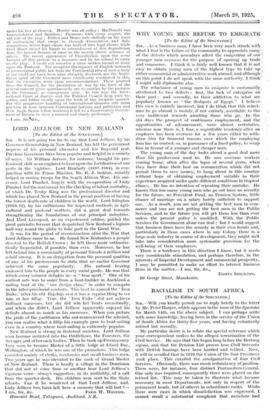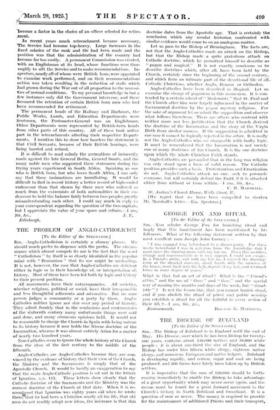RACIALISM IN SOUTH AFRICA
[To the Editor of the SPECTATOR.] SIR,—Will you kindly permit me to reply briefly to the letter by Mr. Peter Harper, which appears in the issue of the Spectator for March 14th, on the above subject. I can perhaps write with some knowledge, having been in the service of the Union of South Africa for thirty-five years, and having voluntarily retired but recently.
My particular desire is to refute the special reference -which your correspondent makes to the alleged terrorization of the Civil Service. He says that this began long before the Hertzog regime, and that the Pension List proves how Civil Servants with British leanings have been harried and retired. Now, it will be recalled that in 1910 the Union of the four Provinces took place. This entailed the amalgamation of four Civil Services. Obviously, there was much redundancy of position. There were, for instance, four distinct Postmasters-General. One only was required, consequently three were placed on the retired list. This may be taken to illustrate what became necessary in most Departments, not only in respect of the permanent heads, but of officers in subordinate ranks. While there were cases in which dissatisfaction was expressed, I cannot recall a substantial complaint that racialism had
"become a factor in the choice of an officer selected for retire- ment.
In recent years much retrenchment became necessary. 'The Service had become top-heavy. Large increases in the
faxed salaries of the rank and file had been made and the position was that the administration of the country had become far too costly. A permanent Commission was created, with an Englishman at its head, whose functions were thor- oughly to sift the Service and to make recommendations. In- spectors, nearly all of whom were British born, were appointed to examine work performed, and on their recommendations action was taken resulting in the reduction of staffs which bad grown during the War out of all proportion to the necessi- ties of normal conditions. To my personal knowledge in but a few. instances only did the Government intervene, and these favoured the retention of certain British born men who had been recommended for retirement.
The permanent heads of the Railway and Harbours, the Public Works, Lands, and Education Departments were Scotsmen, the Postmaster-General was an Englishman. .Other Departments were represented by British-born heads from other parts of this country. All of these took active part in the retrenchments affecting their respective Depart- ments. I mention this to show how baseless the statement is that Civil Servants, because of their British leanings, were being harried and retired.
It is difficult to read calmly the accusations of insincerity made against the late General Botha, General Smuts, and the .many noble men who supported these statesmen during the trying years experienced in South Africa. Speaking as one who is British born, but who loves South Africa, I can only say that these insinuations are humiliating. It would be
difficult to find in recent history a better record of high-smiled endeavour than that shown by these men who sufferad so
much from the extremists of both nationalities in their en- deavour to hold the balance fairly between two peoples greatly misunderstanding each other. I could say much in reply to
your correspondent regarding the question of the two capitals, but I appreciate the value of your space and refrain.—I am,















































 Previous page
Previous page